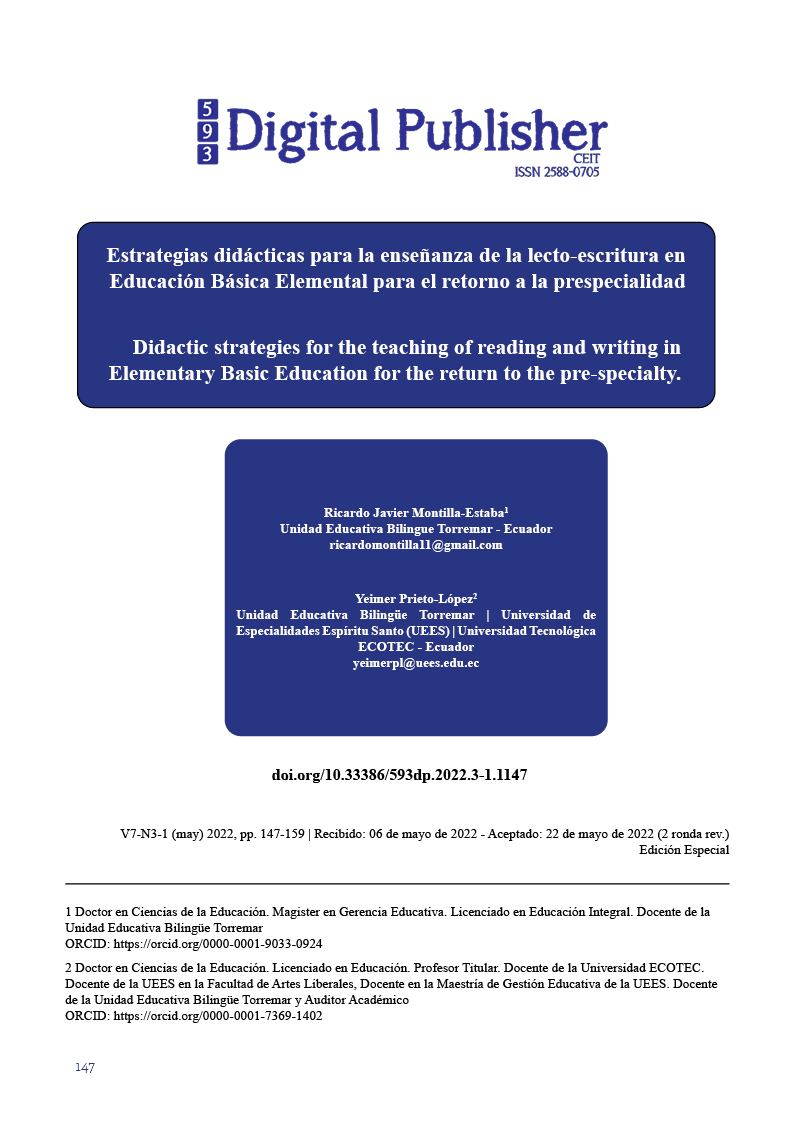Didactic strategies for the teaching of reading and writing in Elementary Basic Education for the return to the pre-specialty.
Main Article Content
Abstract
The main objective of this article is to design didactic strategies for the teaching of reading and writing in Elementary Basic Education in the return to attendance. After the application of the theoretical systematization and the historical-logical method allowed this research to support the main authors who have addressed the variables, the following stand out: Avendaño and Copertari (2022), Cassani (2020), Dussel (2020), Navarrete ( 2021), Santos Guerra (2020). The type of research was based on the methodology of descriptive and documentary studies, as a method the hermeneutic is assumed applying the technique of scientific triangulation, which allowed knowing the relevant aspects in the description of the teaching of reading and writing for the post-pandemic, concluding that education needs to evolve by applying flexible teaching didactic strategies, aimed at the development of fine motor skills for writing and the recognition of sounds, words and sentences for reading comprehension, which allows collectively integrating all students at the Elementary Basic Education level.
Downloads
Article Details

This work is licensed under a Creative Commons Attribution-NonCommercial-ShareAlike 4.0 International License.
1. Derechos de autor
Las obras que se publican en 593 Digital Publisher CEIT están sujetas a los siguientes términos:
1.1. 593 Digital Publisher CEIT, conserva los derechos patrimoniales (copyright) de las obras publicadas, favorece y permite la reutilización de las mismas bajo la licencia Licencia Creative Commons 4.0 de Reconocimiento-NoComercial-CompartirIgual 4.0, por lo cual se pueden copiar, usar, difundir, transmitir y exponer públicamente, siempre que:
1.1.a. Se cite la autoría y fuente original de su publicación (revista, editorial, URL).
1.1.b. No se usen para fines comerciales u onerosos.
1.1.c. Se mencione la existencia y especificaciones de esta licencia de uso.
References
Avendaño, F y Copertari, S (2022) "¿Qué escuela para la postpandemia?". HomoSapiens Ediciones. https://homosapiens.com.ar/
Bernal, C (2010) Metodología de la investigación: para la administración, económica, humanidades y ciencias sociales. Person Educación
Díaz, F. y Hernández, G. (2010). Estrategias docentes para un aprendizaje significativo. Una interpretación constructivista. México: McGraw-Hill.
Dussel, I. (2020). La formación docente y los desafíos de la pandemia. RevistaAcadémicaDigitalEFI,6(10) https://ppct.caicyt.gov.ar/index.
Cassani, D. (2020). Enseñar en época de la COVID-19. Revista El educador, un punto de encuentro. Ediciones Norma. https://co.edicionesnorma.com/
Cisterna, F (2012) Categorización y triangulación como procesos de validación del conocimiento en investigación cualitativa. Transformación Educativa.
Guardiola E y Baños J. ( 2021) La lectura durante la pandemia de covid-19. Ediciones Universidad de Salamanca . https://gredos.usal.es/bitstream/handle/
Hurtado T, FranK (2020) La educación en tiempos de pandemia: los desafíos de la escuela del siglo xxi. CIEG, revista arbitrada del centro de investigación y estudios gerenciales. https://www.grupocieg.org/archivos_revista/
Pineda, L. (2021). La lectura y escritura en tiempos de pandemia. Crónica. Las noticias al día. https://cronica.com.ec/2021/02/08/la-lectura-y-escritura-en-tiempos-de-pandemia .
Martínez-Méndez, K.I (2021). Leer y escribir en tiempos de pandemia. Educación y Ciudad, n. 41, pp. 71- 86. https://doi.org/10.36737/01230425.n41.2021.2530
Monsalve Flórez, J. A. (2021). Potenciar la escritura antes y durante la COVID-19: contraste entre dos secuencias didácticas. Academia Y Virtualidad, 14(1), 87-99. https://doi.org/10.18359/ravi.5265
Navarrete, M. (2021). Estrategias de motivación a la lectura digital en tiempos de emergencia sanitaria. Revista de Ciencias Humanísticas y Sociales, https://revistas.utm.edu.ec/index.php/Rehuso/article/view/1684
Navarro, F, Lerner, D, Meneses, A, López-Gil, K, Artal, R, & Otero, P. (2021). Enseñar a leer y escribir en pandemia. Textos. Didáctica de la Lengua y la Literatura. https://www.researchgate.net/publication/350705763
Rujas Javier y Feito Rafael (2021). La educación en tiempos de pandemia: una situación excepcional y cambiante. Revista de Sociología de la Educación - RASE http://dx.doi.org/10.7203/RASE.14.1.20273
Ruiz Carrillo, Edgardo; Estrevel Rivera, Luis Benjamín (2010) Vygotsky: La escuela y la subjetividad Pensamiento Psicológico, Pontificia Universidad Javeriana Cali, Colombia https://www.redalyc.org/pdf/801/80115648012.pdf
Salinas Dana (2021) fortalecimiento de los procesos de lectura y escritura en tiempos de pandemia. Pontificia Universidad Javeriana.
Santos Guerra (2020) Una pantalla no es la escuela, la dimensión socializadora exige presencia. Red iberoamericana de docentes. http://redesib.formacionib.org/



